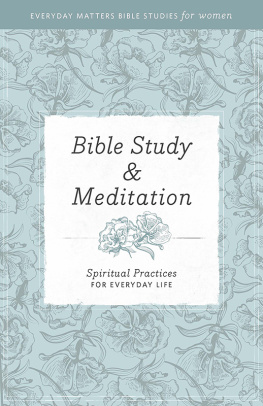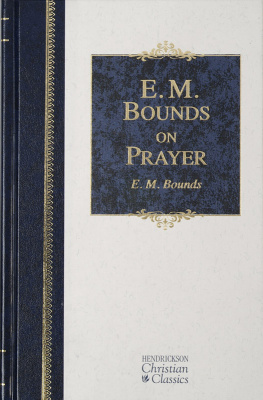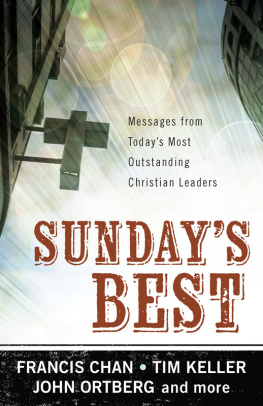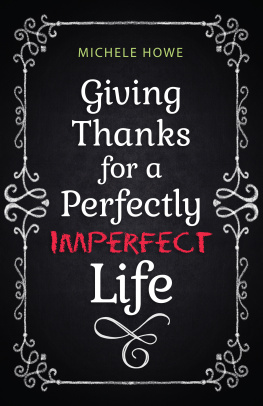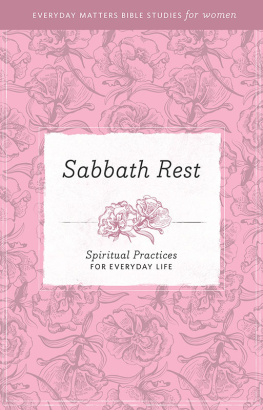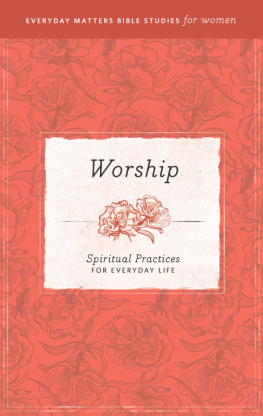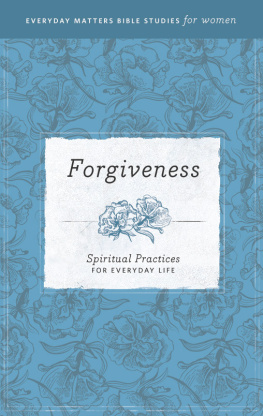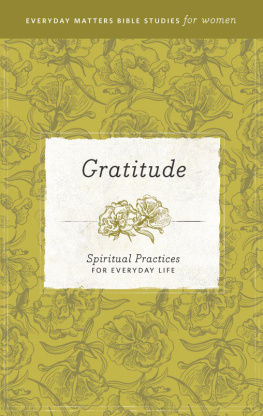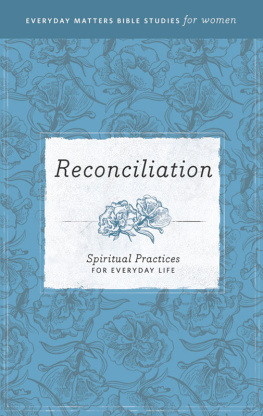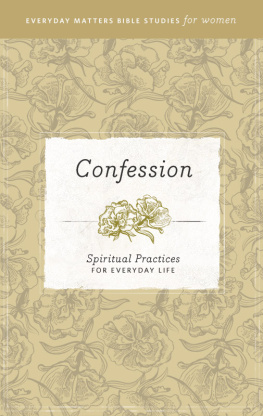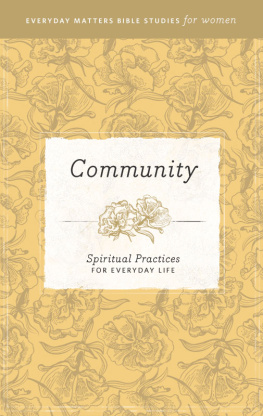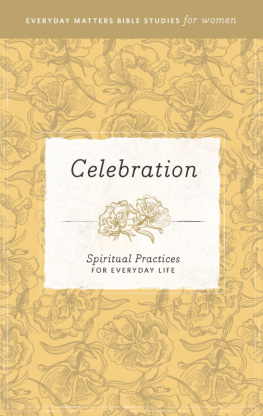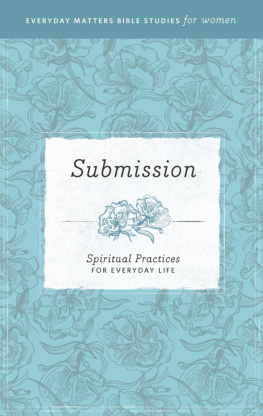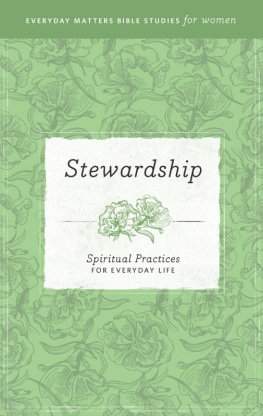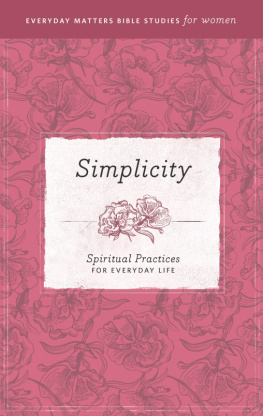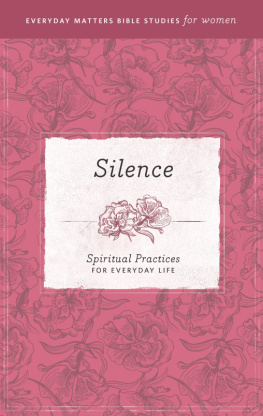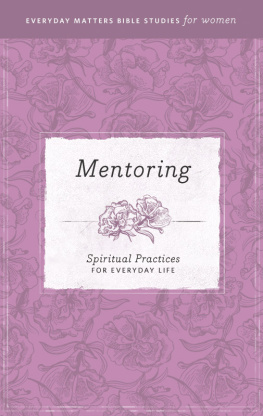P. O. Box 3473
All rights reserved. No part of this book may be reproduced or transmitted in any form or by any means, electronic or mechanical, including photocopying, recording, or by any information storage and retrieval system, without permission in writing from the publisher.
Bible study written by Alison Gerber.
Due to technical issues, this eBook may not contain all of the images or diagrams in the original print edition of the work. In addition, adapting the print edition to the eBook format may require some other layout and feature changes to be made.
Holy Habits
Spiritual Practices for Everyday Life
Everyday life today is busier and more distracting than it has ever been before. While cell phones and texting make it easier to keep track of children and each other, they also make it harder to get away from the demands that overwhelm us. Time, it seems, is a shrinking commodity. But God, the Creator of time, has given us the keys to leading a life that may be challenging but not overwhelming. In fact, he offers us tools to do what seems impossible and come away refreshed and renewed. These tools are called spiritual practices, or spiritual disciplines.
Spiritual practices are holy habits. They are rooted in Gods word, and they go back to creation itself. God has hardwired us to thrive when we obey him, even when it seems like his instructions defy our common sense. When we engage in the holy habits that God has ordained, time takes on a new dimension. What seems impossible is actually easy; its easy because we are tapping into Gods resources.
The holy habits that we call spiritual practices are all geared to position us in a place where we can allow the Holy Spirit to work in us and through us, to grant us power and strength to do the things we cant do on our own. They take us to a place where we can become intimate with God.
While holy habits and everyday life may sound like opposites, they really arent.
As you learn to incorporate spiritual practices into your life, youll find that everyday life is easier. At the same time, you will draw closer to God and come to a place where you can luxuriate in his rich blessings. Here is a simple example. Elizabeth Collings hated running household errands. Picking up dry cleaning, doing the grocery shopping, and chauffeuring her kids felt like a never-ending litany of menial chores. One day she had a simple realization that changed her life. That day she began to use her chore time as a time of prayer and fellowship with God.
Whenever Elizabeth walked the aisle of the supermarket, she prayed for each person who would eat the item of food she selected. On her way to pick up her children, she would lay their lives out before God, asking him to be there for them even when she couldnt. Each errand became an opportunity for fellowship with God. The chore that had been so tedious became a precious part of her routine that she cherished.
The purpose of these study guides is to help you use spiritual practices to make your own life richer, fuller, and deeper. The series includes twenty-four spiritual practices that are the building blocks of Christian spiritual formation. Each practice is a holy habit that has been modeled for us in the Bible. The practices are acceptance, Bible study and meditation, celebration, community, confession, contemplation, faith, fasting, forgiveness, gratitude, hospitality, justice, mentoring, outreach, prayer, reconciliation, Sabbath rest, service, silence, simplicity, solitude, stewardship, submission, and worship.
As you move through the practices that you select, remember Christs promise in Matthew 11:2830:
Come to me, all of you who are weary and carry heavy burdens. Take my yoke upon you. Let me teach you, because I am humble and gentle at heart, and you will find rest for your souls. For my yoke is easy to bear, and the burden I give you is light.
Introduction
to the Practice of Bible Study & Meditation
I still remember the first moment I fell in love with the Bible. I was only nine years old. A new religious education teacher had arrived at my school, and nestled in her arms lay a box full of books: twenty-five copies of the New Testament. Not the childrens Biblethe real thing. She passed them out and opened her copy to Acts.
Anyone ever read Acts before? she asked.
No. None of us had.
Well, lets begin.
And she did. Beginning with Acts 1:1. Week after week, line by line, this strange woman explained and brought alive to a room full of nine- and ten-year-olds the work of God after the ascension of Christ. For the first time ever we heard about tongues of fire, miraculous languages, chains breaking open, men falling out of windows, shipwrecks, island nations, and Gods plan to share his good news with the entire world! It was amazing! No coloring in. No activity sheets. Just a room full of Bibles, a teacher, my classmates, and me.
I cant imagine any other book in the world gripping hold of that class, or my heart, the way the Bible did in my ninth year on Earth. Why? Because the Bible is not just any other book. It is the written word of God.
As Christians, we believe the Bible is authored by God. Theologians refer to this as the inspiration of Scripture, meaning thatthough the books of the Bible were written by human hands and engaged their vocabularies and even personalitiesthe ultimate source of these words is God. All scripture is inspired by God, says Paul in 2 Timothy 3:16.
Christians also understand the Bible to be inerrant, meaning that it is without error. The inerrancy of Scripture is a direct consequence of the Bibles divine authorship: that is, if God is all-powerful, it follows logically that whatever desire or design he had for Scripture, he accomplished that task with perfection. The LORDs promises are pure, writes the psalmist in Psalm 12:6. The perfect written words of God.
But why did he write it? The answer to that question is the same for pretty much any piece of writing: so that he, the author, could communicate to us his readers.
Have you ever considered how wonderful it is that God is a talking God? He speaksto us! And although he does communicate to us through a number of ways, the primary locus of his communication is, and has always been, his written word.

